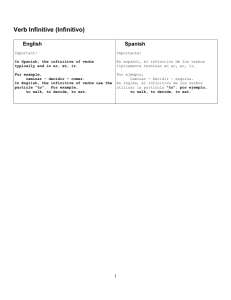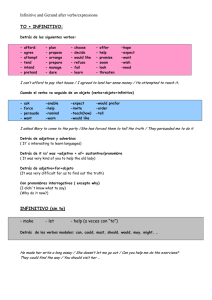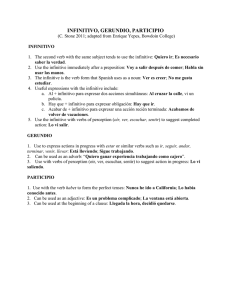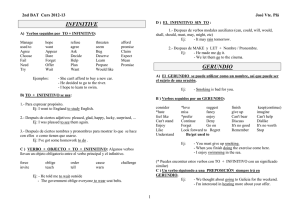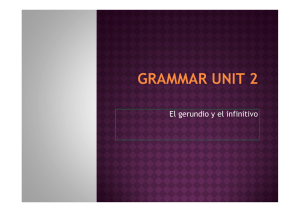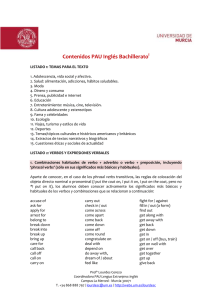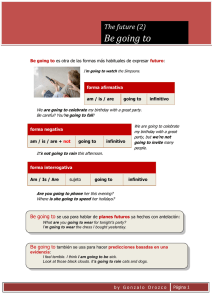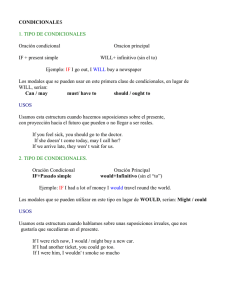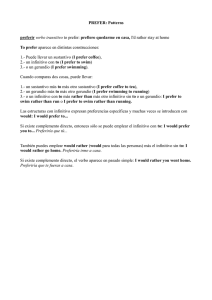Verbs + INFINITIVE (to + verb) Verb + noun/pronoun + Infinitive
Anuncio
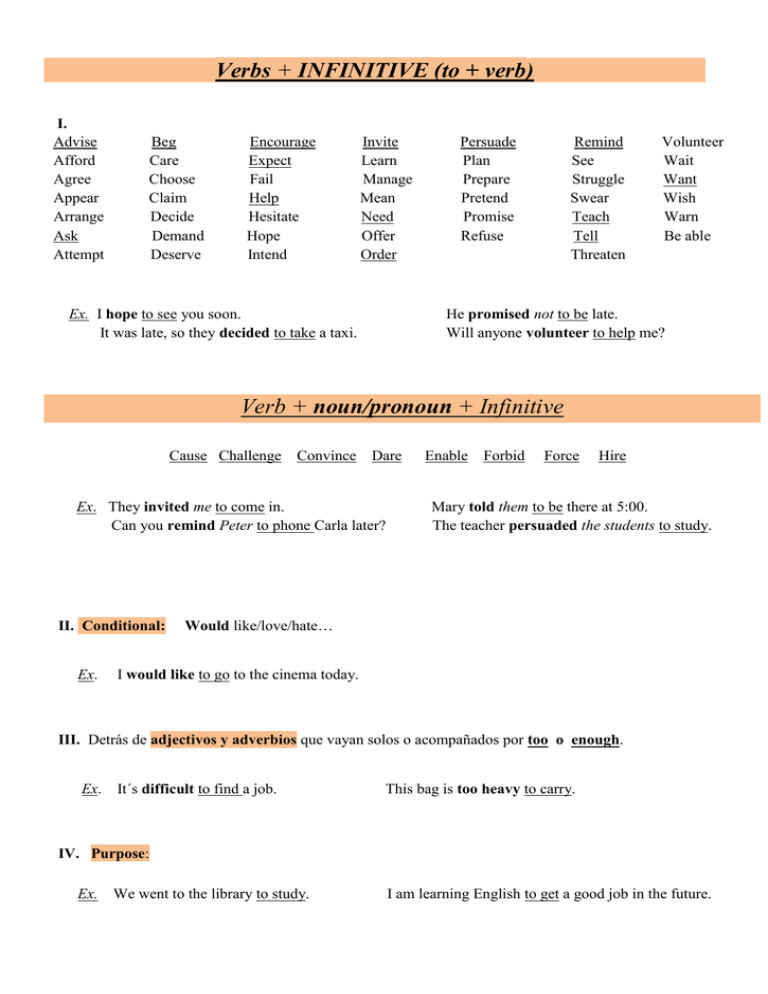
Verbs + INFINITIVE (to + verb) I. Advise Afford Agree Appear Arrange Ask Attempt Beg Care Choose Claim Decide Demand Deserve Encourage Expect Fail Help Hesitate Hope Intend Invite Learn Manage Mean Need Offer Order Ex. I hope to see you soon. It was late, so they decided to take a taxi. Persuade Plan Prepare Pretend Promise Refuse Remind See Struggle Swear Teach Tell Threaten Volunteer Wait Want Wish Warn Be able He promised not to be late. Will anyone volunteer to help me? Verb + noun/pronoun + Infinitive Cause Challenge Convince Dare Ex. They invited me to come in. Can you remind Peter to phone Carla later? II. Conditional: Ex. Enable Forbid Force Hire Mary told them to be there at 5:00. The teacher persuaded the students to study. Would like/love/hate… I would like to go to the cinema today. III. Detrás de adjectivos y adverbios que vayan solos o acompañados por too o enough. Ex. It´s difficult to find a job. This bag is too heavy to carry. IV. Purpose: Ex. We went to the library to study. I am learning English to get a good job in the future. Verbs + GERUND (verb -ing clauses) I. Admit Adore Advise Anticipate Appreciate Consider Delay Deny Describe Discuss Dislike Enjoy Fancy Feel like Finish Imagine Involve Keep Mention Mind Miss Postpone Practise Quit Ex. Have you finished reading the book? We enjoy eating out at weekends. II. Expressions: Can´t help Ex. I can’t help laughing. III. After the adjective worth: IV. Recall Recommend Regret Resist Risk Suggest Tolerate Understand Try to avoid making him angry. Mike suggested going to the baseball game. Can’t stand It´s no fun It’s no good It’s no use It’s no use complaining about the bill. Ex. There is nothing here worth buying. Detrás de preposiciones y de phrasal verbs que son los que llevan una preposición. Ex. She is good at singing. I am interested in visiting Washington D.C. There´s no point in calling Mary because she is in Europe. ** Also after....Look forward to Ex. David looks forward to going on holiday every summer. V. Para expresar actividades generales, como sujeto de la oración. Ex. Finding a job is difficult these days. Swimming is a perfect sport. VI. Detrás de partículas temporales como after, before, since, when, while. Ex. Before going to bed he locked the door. He went to bed after eating dinner. Verbs + INFINITIVE without TO Let Make Feel Hear See Would rather También la mayoría de los verbos modales: Can, Could, Must, May, Might, Should EXCEPTO: Have to, Ought to, Used to Ex. He would rather go to France. Sad films always make me cry. Can I go to the cinema tonight? I used to play the piano every day. Verbs + GERUND or INFINITIVE I. Algunos verbos pueden llevar gerundio o infinitivo indistintamente (without a change of meaning): Begin Continue Hate Intend Like Love Prefer Start Ex. I will start to learn / learning German next year. ** Si se refiere a una ocasión en particular se usa el TO INFINITIVO con algunos verbos: Hate, Like, Love, Prefer...... Ex. I like reading and watching films. I like to read in the evenings. II. Pero en otros casos sí se produce un cambio de sentido que es importante. Regret, Forget, Remember *Si se refiere a una acción antes de que haya pasado (FUTURE) entonces el verbo + to infinitivo Ex. I regret to tell you that I have failed the exam. (Lamentar lo que vas a decir. I am sorry to tell you…) Don’t forget to lock the door before you leave. (Don’t forget what you have to do) I must remember to send a gift to her. (Acordarse de hacer algo. You remember before you do it) *Si se refiere a una acción en el pasado entonces el verbo + gerundio. Ex. I regret telling him so much about myself. (I did it and now I am sorry about it) I´ll never forget meeting Keneau Reeves. (I will never forget that day) I can remember coming to this school for the first time. Stop *Stop + to infinitivo quiere decir que la acción se interrumpió para hacer otra cosa distinta. Ex. He stopped to talk to Peter. I was studying, but I stopped to make dinner. *Stop + gerundio significa “parar de hacer algo.” Ex. He stopped talking to Peter after the fight. It has stopped raining. I love eating out so I have stopped making dinner. Try *Try + to infinitivo significa “intentar” (con algún tipo de esfuerzo). Ex. I tried to phone you but I was very busy. Tom tried to pass his driving test. *Try + gerundio significa “probar” algo como un “experimento” (para ver si te gusta o no). Ex. Have you tried filling the radiator with hot water? I tried working in that shop but I didn´t like it. Allow *Allow + to infinitivo si lleva complemento. Ex. They don´t allow me to sing. *Allow + gerundio si no lleva complemento. Ex. They don´t allow singing.
